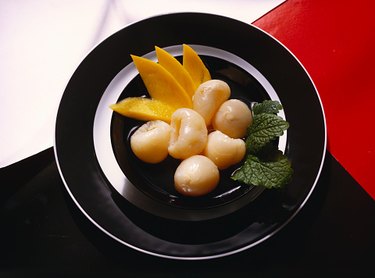
Chinese buffets often include small, white fruits known as lychees. Sometimes called lychee nuts, lychees resemble peeled grapes in shape, texture and flavor. Try them at ethnic restaurants or buy them for use at home. Soft, juicy and sweet, lychees are great for snacks, fruit salads and desserts.
Trees
Lychees grow on dense evergreen trees that are native to parts of southern China. The trees appear in Chinese literature dating back to the 11th century. Since then, lychee trees have been cultivated in other parts of southeastern Asia and in many other countries with accommodating climates, according to Julia Morton's "Fruits of Warm Climates." In the United States, lychee trees now grow in California, Florida and Hawaii.
Fruit
Lychee trees display their fruit in clusters of up to 30. The oval- or heart-shaped fruits have a leathery skin that is sometimes bumpy and usually bright red, the color of strawberries. To get to the fleshy white fruit, you peel back the colorful skin. The fruit should be juicy and separate easily from the brown seed it encloses. The seed itself is inedible.
Nutrition Information
Like many fruits, lychees are low in fat and calories, high in vitamin C and a good source of fiber. One cup of lychees contains 125 calories and just 1 gram of total fat, according to the "Self" Nutrition Data website. It will give you 226 percent of your U.S. recommended daily allowance of vitamin C and 2 grams of dietary fiber, which is 10 percent of your recommended daily allowance of fiber.
Uses
Wherever lychee trees grow, fresh lychees are peeled, seeded and eaten straight off the tree. Lychees can be frozen or canned in syrup and sold in stores all around the world. Some people eat dried lychees, which are small and brown and have a concentrated sweetness the way raisins do. Occasionally, people use lychees to make jellies, preserves, wine and other fruit products.